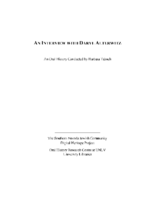Search the Special Collections and Archives Portal
Search Results

Transcript of an interview with Gertrude Rudiak, Richard Rudiak, and Dani Ramage by Barbara Tabach, December 30, 2015
Date
Archival Collection
Description
On December 30, 2015, a few months after her 100th birthday celebration, Gertrude Rudiak, with the help of her son Richard Rudiak and granddaughter Dani Ramage, reminisced about living in Las Vegas since 1946, nearly eighty years. They explore the ancestral roots of Gertrude (n?e Rightman) and of her deceased husband George Rudiak. Their courtship and marriage at the brink of World War II and George?s enlistment in the US Army Corps is what brought the couple to Las Vegas and the gunnery school which is now Nellis Air Force Base. After his tour of duty, George settled into a law practice where he specialized in quickie-divorces, but also carved out a reputation supporting civil rights and working for legislation to eliminate working and living discrimination of blacks in Nevada. Gertrude was an active member of Las Vegas. She played the pipe organ, hosted large Seders at Passover and managed the Rudiak household that grew to include five children. Over her long life, Gertrude embraced many positions on community boards, including being Temple Beth Sholom?s first female board member. She was also a teacher in both secular and Jewish education. Her efforts have been recognized by the Jewish National Fund, the United Jewish Appeal, and the Anti-Defamation League. Additionally, Mayor Carolyn Goodman presented Gertrude with the distinguished honor of a key to the city of Las Vegas in 2014. The city declared August 2, Gertrude's birthday, Gertrude Rudiak Day in recognition of her long-standing commitment to Las Vegas.
Text

Transcript of interview with Jay Poster by Barbara Tabach, August 26, 2016
Date
Archival Collection
Description
Music brought Jay Poster to Las Vegas for a brief time in 1974. Jay wanted to pursue a musical career and his cousin was a professional musician with the Nat Brandwynne Orchestra at Caesars Palace. To Jay?s disappointment, within a few months his cousin Jack Poster left Las Vegas for a road tour. So Jay decided his best strategy was to return home to San Diego and his studies at San Diego State University. It would be over a decade later before Jay returned to Las Vegas to live and this time it became permanent. This time it was not for music. For beyond his musical talent, Jay had a gift for connecting with people of all of ages and walks of life. He was good at sales and his day job selling office furniture offered him the opportunity to transfer to Las Vegas in 1986. Within a few years, however, it was a recruiter for Palm Mortuaries who introduced Jay to his defining career moment and to Allen Brewster, a prominent Jewish leader and founder of King David Cemetery and Mortuary. It was 2001. Jay has been King David?s ever since and is the General Manager. In this interview, Jay describes his personal and spiritual growth through his career in funeral services and his respect for the Jewish traditions of burial and grieving. In addition, his passion for music has also soared and he talks about his participation in the Shabbatones at Congregation Ner Tamid and Desert Winds, a community based performance organization. He shares his love of traditional Jewish klezmer music and the Meshugginah Klezmorim.
Text

Transcript of interview with Renee Diamond by Barbara Tabach, November 20, 2014
Date
Archival Collection
Description
In this interview, Renee Diamond discusses coming to Las Vegas via Los Angeles, with her husband and children in the 1970s and getting involved in politics. She talks about her husband, Leo, and his business selling vinyl records in L.A., and her work in a doctor's office. Once in Las Vegas, the Diamonds joined Temple Beth Sholom and later Congregation Ner Tamid. Renee talks about her involvement in the political arena in southern Nevada, including the League of Women Voters.
Community activism and social justice rank high in the legacy of Renee Diamond. She often refers to herself as one of the last of the generation without college degrees that could make a difference in the politics of the state. When Renee, her husband Leo Diamond moved their family to Las Vegas from southern California, the energetic advocate Renee quickly plugged into the community. The word "No" was not part of her vocabulary. Among the many Jewish and secular activities the she engaged in were: the editorial board of the Jewish Reporter newspaper; Hadassah; Anti-Defamation League; Red Cross Board; State Museum Board to name a few. She remains a vibrant Democratic Party leader and served one term on the Nevada Assembly in 1989. She was on the front lines as a fierce and active supporter of Welfare Rights, Fair Housing and the Equal Rights Amendment. It is a life that included working alongside illustrious women and men of Southern Nevada history. A list that includes: Harriet Trudell, Ruby Duncan, Myrna Williams and Dorothy Eisenberg and many more mentioned here. Meanwhile she raised four children and enjoyed a loving 43-year marriage with Leo (aka "Uncle Leo") whose career included the popular Bingo Palace, Slots-A-Fun and Stations Casinos. During this oral history interview she recalls the Las Vegas that she moved to in 1972 and reflects on what attracted people here, ways to be part of the Jewish life which might even include a bowling league and how involvement in raising social awareness was a worthy investment of ones' time. This is a look at a woman who made a difference.
Text

Transcript of interview with Adele Baratz by Steve McClenachan, March 3-4, 1979
Date
Archival Collection
Description
Interview with Adele Baratz by Steve McClenachan on March 3 and 4, 1979. In this interview, Baratz talks about growing up in Las Vegas and her her schooling. She graduated from Las Vegas High School in 1944, and discusses the rationing that took place during World War II. She went to Maryland for nursing school and returned to Las Vegas in 1947. She describes some of the hotels and casinos, and tells the story of her father trading property for an automobile in 1935. She also recalls the building of Hoover Dam, swimming in local pools, and going to Mount Charleston in the winter. The interviewer asks her about travel between Las Vegas and California and the impact of Atlantic City on Las Vegas tourism. Baratz then talks about her nursing career and starting a re-certification program in 1974 and the different hospitals in the area.
Text

Transcript of interview with Daryl Alterwitz by Barbara Tabach, November 8, 2014
Date
Archival Collection
Description
Interview transcript with Daryl Alterwitz by Barbara Tabach on November 8, 2014. In this interview Daryl Alterwitz, son of Deanne and Oscar Alterwitz, recalls moving to Las Vegas from Gary, Indiana, for his parents' pursuits in the furniture business. He speaks about his schooling at Valley High School, his friendship with Robert Engel, and attending University of California Santa Cruz, and taking a leave of absence to travel through Asia. Alterwitz became more involved in Judaism after his bar mitzvah, and has continued his religious affiliation throughout his adult life, and has traveled to Israel twice. He talks about meeting his former wife, his travels through Europe, and coming back to Las Vegas after some time in Reno.
In 1959, Daryl Alterwitz was born in Gary, Indiana, son of Oscar and Deanne Alterwitz. When he was thirteen years old, his family moved to Las Vegas to capitalize on new opportunities in the growing city, and his parents purchased Walker Furniture soon after their arrival. As a high school student, Daryl experienced a powerful trip to Israel, which strengthened his connection to Judaism. After graduation from Valley High School, Daryl attended the University of California - Santa Cruz, and after two years of study, Daryl took time off to travel throughout South Asia, accompanied by close childhood friend Robert Engel. He returned after a year and graduated with an independent major in classical studies. From there, Daryl spent more time in Israel living on a kibbutz. Daryl next went to law school at Santa Clara University, and then supplemented his education with a degree in taxation from New York University School of Law. Between law school and New York, he met his wife, Teri Shoofey; they two had two children, though are now divorced. After New York, he returned to Nevada, first living in Reno. After his father passed away, Daryl moved back to Las Vegas, and took on more responsibility with the family business as well as practicing law. Daryl?s commitment to community service is enduring and visible. He has donated his time and resources to both Jewish organizations, like Jewish Family Services, and non-Jewish groups, like Las Vegas Rescue Mission. He has also served on the boards of the Jewish Federation, Congregation Ner Tamid, and the Anti-Defamation League. Daryl also continues to indulge his passion for international travel, having visited Morocco, Egypt, Turkey, Cambodia, and has even biked from Hungary to Poland.
Text

Transcript of interview with Harry Sax by Barbara Tabach, April 8, 2015
Date
Archival Collection
Description
Interview with Harry Sax by Barbara Tabach on April 8, 2015. In this interview, Sax discusses his family history and upbringing in Chicago, and his military service in Munich. He returned to Chicago and became business partners with Michael Schulson, with whom he opened several Arby's outposts, and expanded to Las Vegas in 1968. He talks about life in Las Vegas in the 1970s and the competition in the fast food industry. He then talks about the reform congregation in Chicago and his connection to Judaism throughout his life. He describes himself as a "closet Jew" before becoming president at Congregation Ner Tamid in 2007. Sax discusses the programs at Ner Tamid for all ages, and his continued involvement in the community.
In 1939, Harry Sax was born in Chicago, Illinois, the son to first generation American Jews. He spent his childhood on Chicago's South, where his family belonged to a progressive Reform congregation. After graduating from Hyde Park High School, he continued his education at Indiana University. In college, Harry was a member of the ZBT Jewish fraternity, participated in a singing group, and was a cadet in the Reserve Officers' Training Corps. Upon graduating from college, Harry was stationed in Munich, Germany as a second lieutenant in the Quartermasters Corps. In addition to his required military duties, he also participated in an after-hours acting group; through this group, he was hired as an extra and for small roles, including The Great Escape. When he finished his service, Harry returned to Chicago, where he connected with a high school friend, Mike Schulson. The two became partners and purchased Arby's franchises in Chicago and Las Vegas. Thus, in 1968, while his partner remained in Chicago, Harry moved to Las Vegas and opened two franchise locations in two weeks. Though it took a few years to stabilize the business and overcome competition, he opened a third location in 1972 on South Decatur, what was then the western edge of the city. Today, Harry has nineteen locations in Las Vegas, with additional franchises in Reno and Barstow, California, and employs nearly 300 people. After about twenty years as a "closet Jew" in the city, Harry reconnected with Judaism and joined Congregation Ner Tamid in the late 1990s. He served on its board, eventually becoming vice president and then president (2007-09). He also dedicated himself to have a bar mitzvah, following up on his Jewish education and confirmation as a teenager. Harry has also served on the Anti-Defamation League's board as well as an active member of the Chamber of Commerce.
Text

Transcript of interview with Steven Eisen by Barbara Tabach, September 14, 2016
Date
Archival Collection
Description
Steven Eisen (1966 - ) is the oldest son of Barry and Beverly Eisen, who were part of the migration of Jews from St. Louis to Las Vegas in the 1960s. He is married to Stacy Fisher and the older brother to Andrew and Robert Eisen. They are members of an early group of born-and-raised Las Vegans. Growing up Jewish, he became a bar mitzvah, belonged to B?nai B?rith Youth Organization. In this oral history interview, Steve recalls enjoyable stories of growing up in Las Vegas and humorous anecdotes of mistaken identity since the three brothers bear such strong physical resemblances. Today he finds himself enjoying his career as CEO of the Children?s Heart Center since 2001 and talks about the success and reputation of the pediatric medical group. It was his first job as a fourteen year old helping Theodore Manos and Michael Cherry during the MGM fire litigations where he learned about the legal world and being organized as a path to success in whatever he might pursue. Steve graduated from University of Missouri, attended law school at Washington University in St. Louis, and received his business degree from UNLV. Throughout the interview, he recalls the steady and strong involvement of his parents in their sons? educations. He also describes their active connection with the Jewish community and organizations. Steve?s wife Stacy is a professor in physical therapy at Touro University.
Text

Transcript of interview with Shawn Willis by Barbara Tabach, May 5, 2017
Date
Archival Collection
Description
Shawn Willis (1972 - ) grew up in a culturally diverse area outside of Detroit, Michigan. She has made Las Vegas her home since 2004. Since moving to Nevada, she ?acknowledged? her Judaism and built a robust network within the Jewish community as an entrepreneur and tireless leader. From 2015 ? 2017, she held the position of Director of the Jewish National Fund of Las Vegas. The Jewish National Fund is a worldwide organization that was founded in 1901 to meet the strategic challenges of building in Israel and developing the infrastructure for ecology, special needs and heritage preservation. Among the local initiatives that Shawn led was a program on water conservation. In this oral history, Shawn candidly speaks of being a convert to Judaism. She also shares how she introduced herself into the Las Vegas community in a vibrant way through her marketing expertise and business. Shawn currently serves on the UNLV Foundation?s President?s Associates Council and is an active person in the Las Vegas community. Shawn is a graduate of University of Detroit Mercy.
Text

Transcript of interview with Irwin Kishner by Claytee D. White, September 10, 2013
Date
Archival Collection
Description
Irwin Kishner (1933 ? 2017) was a noted real estate developer, attorney and longtime community leader. In this oral history interview conducted in 2013, he briefly shares his childhood growing up Jewish in Brighton Beach area of Brooklyn, New York. He often speaks of himself in the third person, as he brings to life his roots, his family?s move to Miami where he graduated from high school and the tale of his relocation to Las Vegas to work with his uncles Herman and Maury Kishner. He describes his entrance to Las Vegas as that of a bon vivant. And truly, Irwin, fell in love with the city from the moment he arrived in 1960. Irwin was a graduate of University of Florida (1954) and University of Miami Law School (1958). Both his daughters, Sharon and Joanna, were born in Las Vegas and he reminisces about becoming a Jewish bachelor father to them. In June 2013, shortly before this interview, Irwin celebrated his 80th birthday. He was a proud father, grandfather and energetic businessman who left an indelible mark on everyone he knew. As a developer, he was known for the Somerset Apartments, Somerset House Motel, Somerset Gardens apartment complex, and the Somerset Shopping Center. He enjoyed reflecting on the many community organizations he dedicated himself to, from the Las Vegas Convention and Visitors Authority to Opportunity Village to the original Las Vegas Rotary Club to the Community Concert Association?and that?s just to mention a few.
Text

Transcript of interview with Janet Garry by Elyse Rozinsky, February 24, 1979
Date
Archival Collection
Description
On February 24, 1979, collector Elyse Rozinsky interviewed file clerk, Janet Garry, (born on November 24th, 1927, in Louisiana) at her home in Bonanza Village Trailer Park in Las Vegas, Nevada. This interview covers the growth of Las Vegas from 1952 to 1979. Janet recalls the early years of the television and the telephone. She also discusses her own personal experience of raising a family in Las Vegas.
Text
